FAQ: What is the Purpose of a Transvaginal Mesh Implant?
- Last Updated: June 12th, 2025

Attorney Jessica Paluch-Hoerman, founder of TruLaw, has over 28 years of experience as a personal injury and mass tort attorney, and previously worked as an international tax attorney at Deloitte. Jessie collaborates with attorneys nationwide — enabling her to share reliable, up-to-date legal information with our readers.
Legally Reviewed
This article has been written and reviewed for legal accuracy and clarity by the team of writers and legal experts at TruLaw and is as accurate as possible. This content should not be taken as legal advice from an attorney. If you would like to learn more about our owner and experienced injury lawyer, Jessie Paluch, you can do so here.
Fact-Checked
TruLaw does everything possible to make sure the information in this article is up to date and accurate. If you need specific legal advice about your case, contact us by using the chat on the bottom of this page. This article should not be taken as advice from an attorney.
Key takeaways:
- Transvaginal mesh implants support weak pelvic tissues in women and help treat conditions like urinary leakage and organ fall.
- Some complications from these implants can be severe, leading FDA to limit their use for pelvic organ prolapse repairs.
- If the implant causes problems, women should seek medical attention or consider legal options to claim compensation.
- There are non - surgical ways like pelvic floor therapy or surgical treatments as alternatives to using mesh implants.
What is the Purpose of a Transvaginal Mesh Implant? Lets Discuss.
Question: What is the purpose of a Transvaginal Mesh Implant?
Answer: The purpose of a transvaginal mesh implant is to provide support and repair weakened or damaged internal tissue in women.
This surgical procedure aims to help hold up prolapsed (fallen) organs, such as the bladder, uterus, or rectum.
The Purpose of a Transvaginal Mesh Implant is to:
- Provide support for prolapsed organs
- Repair weakened or damaged internal tissue
- Help restore normal organ function
The mesh is inserted through an incision in the vaginal wall, and the goal is for a woman’s tissue to grow into the holes of the mesh, creating a supportive wall.
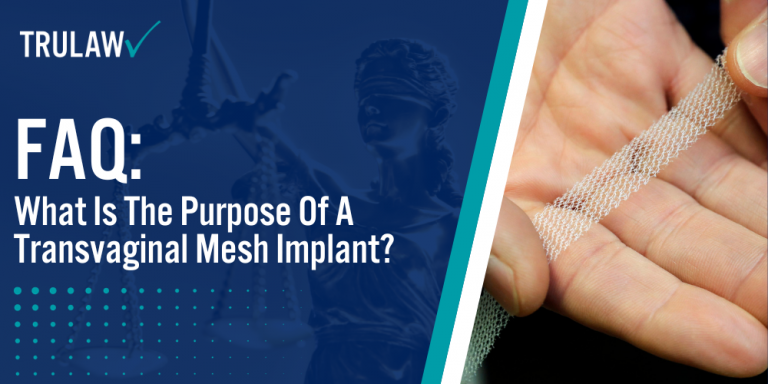
On this page, we’ll discuss this question in further depth, common issues associated with Transvaginal Mesh implant surgical procedures, alternative treatment options for Pelvic Organ Prolapse (POP) and Stress Urinary Incontinence (SUI), and much more.
Transvaginal Mesh Implant: How It Works
Transvaginal mesh implants are designed to provide extra support and stability to weakened or damaged internal tissue.
Here are some key points about how transvaginal mesh implants work:
- The surgery involves making an incision in the vaginal wall.
- Mesh is then inserted to help hold up the prolapsed organs.
- The mesh acts as a supportive wall, allowing a woman’s tissue to grow into the holes of the mesh.
- This tissue growth helps provide long-term support and stability to the repaired area.
Table of Contents
What is the Purpose of a Transvaginal Mesh Implant?
Transvaginal mesh is a medical device often used in surgeries to treat conditions like pelvic organ prolapse, stress urinary incontinence, and pelvic floor disorder.
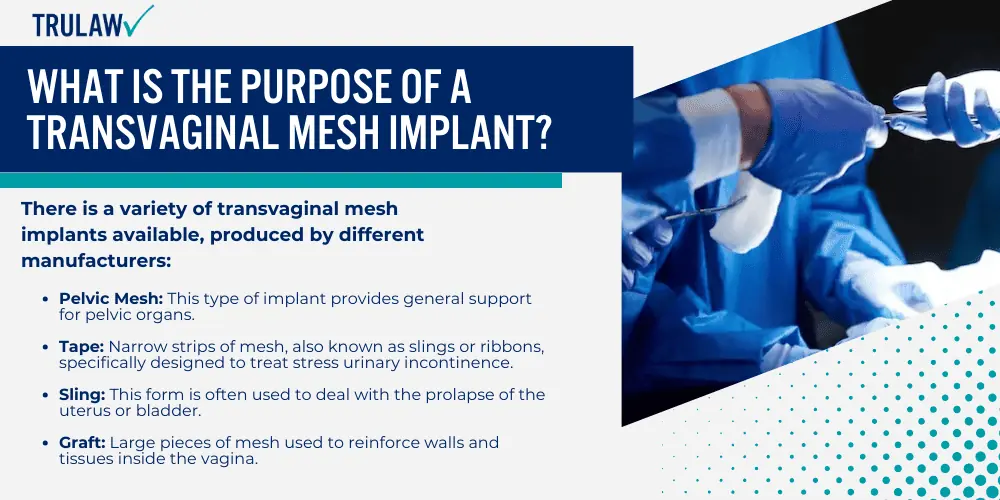
Surgeons use it to provide support to weakened or damaged tissues in the women’s pelvic area.
This net-like implant plays a vital role in treating two significant conditions: stress urinary incontinence, where pressure on your bladder causes uncontrolled urine leakage, and pelvic organ prolapse, a condition where organs like the uterus, rectum, or bladder drop due to weak supporting muscles and ligaments.
The procedure involves an incision into the vaginal wall through which surgeons position the mesh sling to lift and hold fallen organs securely.
Uses in Pelvic Floor Surgery
Surgeons utilize transvaginal mesh in pelvic floor surgery to deal with conditions such as pelvic organ prolapse and stress urinary incontinence.
The aim of the implant is to provide support by reinforcing the weakened or damaged tissues.
By setting the mesh into the vaginal wall, it acts as a supportive netting, effectively holding up prolapsed organs.
The strategic placement and anchoring of this device help restore functionality to pelvic floor muscles, offering relief from symptoms associated with prolapse.
Studies show that permanent transvaginal mesh reduces rates of recurrence for both these conditions and lessens the need for repeat surgeries compared to native tissue repair.
This makes it a preferred choice in alleviating issues linked with women’s reproductive health.
Types and Manufacturers
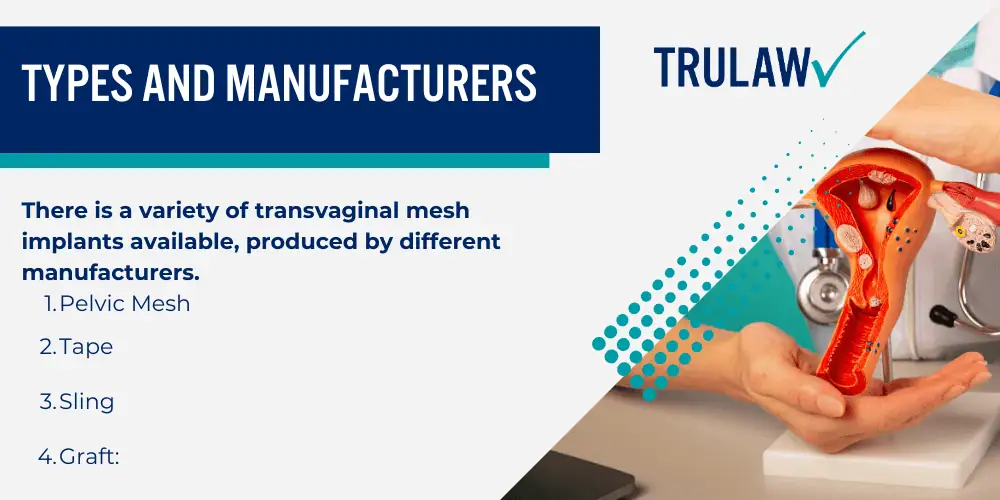
There is a variety of transvaginal mesh implants available, produced by different manufacturers.
- Pelvic Mesh: This type of implant provides general support for pelvic organs.
- Tape: Narrow strips of mesh, also known as slings or ribbons, specifically designed to treat stress urinary incontinence.
- Sling: This form is often used to deal with the prolapse of the uterus or bladder.
- Graft: Large pieces of mesh used to reinforce walls and tissues inside the vagina.
Common Issues With Transvaginal Mesh Implant Surgery
Despite its initial promise, transvaginal mesh surgery has been linked to numerous complications, leading the FDA to ban many of these products and significantly limit their current use.
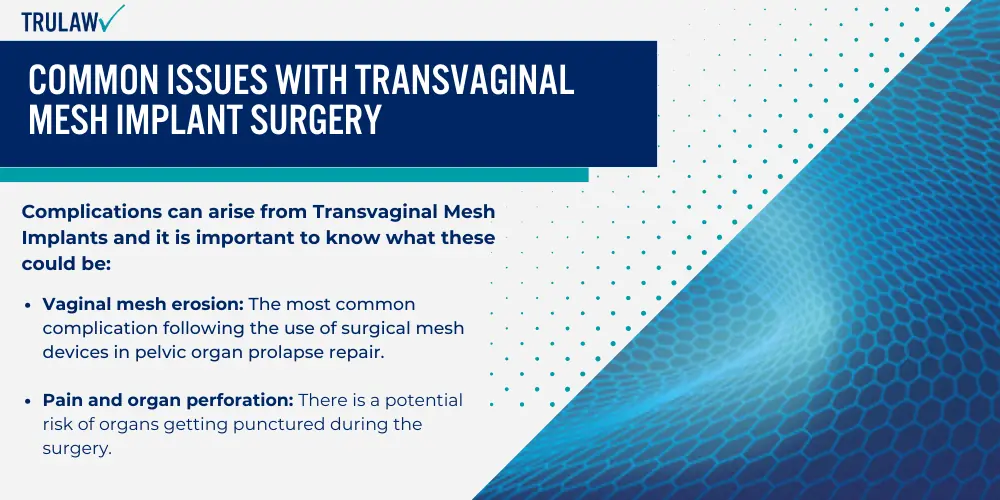
Transvaginal Mesh Implant Complications
Complications can arise from Transvaginal Mesh Implants and it is important to know what these could be.
- Vaginal mesh erosion: Being the most common complication following the use of surgical mesh devices in pelvic organ prolapse repair, it can lead to severe discomfort and further health problems.
- Pain and organ perforation: There is a potential risk of organs getting punctured during the surgery.
- Infections: Although rare, infection rates due to transvaginal mesh surgery have been reported in 0-8% of cases.
- Discomfort ranging from mild to debilitating: Irregular vaginal bleeding or discharge, pelvic pain or swelling, and discomfort are some of the adverse symptoms that may occur post-surgery.
- Higher rates of mesh – related complications have been linked with the use of surgical mesh through vaginal surgeries for pelvic organ prolapse.
- Transvaginal mesh surgery for pelvic organ prolapse is considered a more complicated surgery compared to other treatments options available, thus increasing chances of complications.
FDA Ban: Pelvic Organ Prolapse
The FDA enforced an official ban on the use of transvaginal mesh to treat pelvic organ prolapse. This decision came into effect in 2019, following a thorough review and increasing reports of severe complications associated with its use.
Notably, many women experienced substantial pain during sexual intercourse, urinary problems, and even organ perforation after undergoing this surgery.
It’s important to clarify that the FDA ban only applies to procedures meant to cure pelvic organ prolapse using transvaginal mesh implants.
However, these devices were not banned from being used in other types of surgical procedures such as stress urinary incontinence (SUI) surgeries or abdominal repair of pelvic organ prolapse.
The move underscores the agency’s commitment toward ensuring patient safety while also acknowledging that more effective and safer treatment options need to be made available for conditions like pelvic organ prolapse.
Current Uses: Stress Urinary Incontinence
Despite the FDA’s ban, transvaginal mesh is still used in specific instances to manage women’s health concerns.
Here are its current uses:
- The mesh continues to aid in managing stress urinary incontinence. This use typically results in fewer complications, as highlighted by recent studies.
- Surgeons use it during abdominal surgeries for pelvic organ prolapse treatment.
- It comes into play when non – surgical treatments like physiotherapy and pessaries prove ineffective.
- Transvaginal mesh can support the vaginal wall, mitigating the risk of prolapse recurrence.
- Medical practitioners utilize it as a last resort for severe cases that do not respond well to other treatments.
Alternative Treatment Options
There are several non-surgical and surgical alternatives to transvaginal mesh implant for treating pelvic organ prolapse or urinary incontinence, offering decreased risks and personalized care.
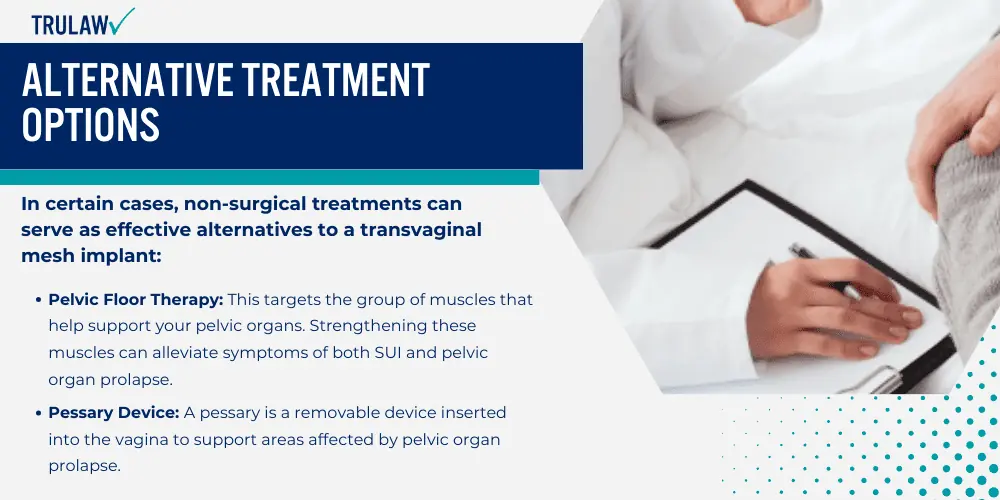
Continue reading to discover these safer treatment methods available today.
Non-surgical Treatments
In certain cases, non-surgical treatments can serve as effective alternatives to a transvaginal mesh implant. These alternative methods aim to treat conditions such as stress urinary incontinence (SUI) and pelvic organ prolapse without requiring invasive procedures.
- Pelvic Floor Therapy: This targets the group of muscles that help support your pelvic organs. Strengthening these muscles can alleviate symptoms of both SUI and pelvic organ prolapse.
- Pessary Device: A pessary is a removable device inserted into the vagina to support areas affected by pelvic organ prolapse.
- Biofeedback: This technique helps you learn control over specific bodily functions such as muscle tension which can be beneficial for managing SUI.
- Burch Colposuspension: In this minimally invasive procedure, stitches are used to lift the urethra into a normal position, aiding in improving bladder control.
- Lifestyle Changes: Smoking cessation, weight management, limiting caffeine intake and regular physical activity can all improve symptoms of SUI.
Surgical Mesh Treatments
Surgical treatments offer alternative solutions to transvaginal mesh implants.
Here are some that can be considered:
- Pelvic floor exercises: This non-invasive approach strengthens the muscles that support the pelvic organs. They improve incontinence and reduce prolapse symptoms.
- Pessary fitting: Doctors sometimes recommend pessaries, small plastic or silicone devices placed into the vagina to support sagging structures.
- Native tissue repair: This surgical method uses a woman’s own tissues to repair pelvic organ prolapse.
- Laparoscopic Sacrocolpopexy: In this procedure, surgeons use a laparoscope to sew mesh onto the vagina and attach it to a strong ligament on the spine.
- Hysterectomy: Some women may choose to have their uterus removed if other treatments fail or aren’t possible.
What Should Women Do If They Have Concerns?
If you’re concerned about potential risks or complications of transvaginal mesh implants, it’s crucial to consult with your healthcare provider to discuss possible alternatives and implications; read on for more advice on seeking medical attention and exploring legal options.

Seeking medical advice
Doctors play a vital role in deciphering health concerns related to transvaginal mesh implants.
They can thoroughly evaluate symptoms and may detect any complications early on.
Medical professionals bring their expertise to the table by providing necessary guidance and advice on potential issues one might face with these implants.
Women who experience discomfort or other unusual symptoms after an implant procedure should not hesitate to consult a healthcare provider immediately.
It’s crucial that women trust their instincts, listen to their bodies, and reach out for medical help when needed – it can make all the difference in managing possible risks associated with transvaginal mesh implants effectively.
Legal options
Women who suffer complications from transvaginal mesh implants have the right to explore legal avenues.
Filing a lawsuit can help them receive compensation for their pain, suffering and financial losses.
The process involves hiring an attorney specializing in medical malpractice or defective product cases, particularly those related to transvaginal mesh implants.
These attorneys gather evidence such as medical records and expert witness testimonies before proceeding with the case.
Successful lawsuits can lead to significant jury awards and settlements providing victims with much-needed relief for their hardship caused by these implants.
TruLaw: Helping Women with Transvaginal Mesh Lawsuits
TruLaw is passionately dedicated to championing the legal rights of women who are suffering from the complications of transvaginal mesh implants; with experienced attorneys, they offer free consultations and comprehensive support.
Read on for more about how TruLaw can guide you through your legal journey.
Free consultation
TruLaw stands ready to assist women dealing with transvaginal mesh lawsuits, offering free consultations.
They understand the urgency and sensitivity of these cases and provide expert advice based on years of experience in handling similar situations.
It’s an essential step towards learning about your legal rights and understanding what you might expect from potential courtroom proceedings.
Seeking a free consultation could be a useful starting point if you are affected by a transvaginal mesh implant, as it can pave the way for legal recourse tailored to your situation.
Experienced attorneys
TruLaw boasts a formidable team of seasoned attorneys dedicated to the fight against transvaginal mesh complications.
These legally savvy warriors possess broad knowledge about the intricacies of transvaginal mesh lawsuits, making them a potent ally for any woman seeking justice.
Thanks to their tireless work and unmatched expertise, they have successfully secured millions in jury awards and settlements for thousands of victims.
The escalating number of lawsuits speaks volumes about the far-reaching effects of this medical issue, further emphasizing the vital role these experienced legal professionals play in taking on big manufacturers and advocating for women’s health rights.
With TruLaw’s expert lawyers at your side, you stand a powerful chance at securing fair compensation for damage caused by faulty transvaginal mesh implants.
Complications and Reoperations with Transvaginal Mesh
Transvaginal mesh implantation, while offering relief to conditions like stress urinary incontinence and pelvic organ prolapse, can sometimes lead to unforeseen complications.
These may surface as mild irritations or severe adverse effects that demand immediate medical attention.
With infections reported in about 0-8% of the cases, proactive monitoring post-surgery is crucial.
A range of potential complications are associated with transvaginal mesh implants.
For some women experience bleeding, pelvic pain or discomfort during intercourse due to the implant.
In more serious instances, mesh erosion occurs when parts of the implanted material wear through neighboring tissues and organs causing intense discomfort and other health risks.
When these challenges arise, physicians often resort to reoperations for resolving such issues – a daunting reality for many patients grappling with initial surgical recovery.
Transvaginal Mesh Lawsuit Frequently Asked Questions
-
The purpose of a transvaginal mesh implant is to provide support and repair weakened or damaged internal tissue in women.
This surgical procedure aims to help hold up prolapsed (fallen) organs, such as the bladder, uterus, or rectum.
The Purpose of a Transvaginal Mesh Implant is to:
- Provide support for prolapsed organs
- Repair weakened or damaged internal tissue
- Help restore normal organ function
The mesh is inserted through an incision in the vaginal wall, and the goal is for a woman’s tissue to grow into the holes of the mesh, creating a supportive wall.
-
Transvaginal mesh implants are designed to provide extra support and stability to weakened or damaged internal tissue.
Here are some key points about how transvaginal mesh implants work:
- The surgery involves making an incision in the vaginal wall.
- Mesh is then inserted to help hold up the prolapsed organs.
- The mesh acts as a supportive wall, allowing a woman’s tissue to grow into the holes of the mesh.
- This tissue growth helps provide long-term support and stability to the repaired area.
-
A transvaginal mesh implant, also known as a tape, sling, ribbon, or mesh, is a net-like device that is surgically implanted through the vagina.
It is commonly used to treat conditions such as stress urinary incontinence and pelvic organ prolapse.
The mesh is designed to support the vaginal wall and provide structural reinforcement.
However, there have been concerns about complications associated with transvaginal mesh implants.
-
Transvaginal mesh implants are used to treat pelvic organ prolapse (POP) and stress urinary incontinence (SUI).
However, there are potential risks and complications associated with this procedure.
Common complications associated with a transvaginal mesh implant include:
- Irregular vaginal bleeding or discharge
- Pelvic pain or swelling
- Discomfort during sexual intercourse
- Bladder and bowel problems, such as infection and incontinence
These complications can significantly impact a patient’s quality of life and may require additional medical intervention.
It is important for patients considering transvaginal mesh implants to be aware of these potential risks and complications.
-
There are several alternatives to transvaginal mesh implants for the treatment of pelvic organ prolapse and stress urinary incontinence.
The alternatives to a transvaginal mesh implant include:
- Native tissue repair: This surgical treatment involves using the patient’s own tissue to repair the prolapse. It can be an effective alternative to mesh implants.
- Biological graft repair: This approach uses a graft from a source such as human or animal tissue to support the vaginal prolapse. It provides a natural alternative to synthetic mesh.
- Pubovaginal sling: This procedure utilizes the patient’s own tissue to create a sling that supports the bladder and urethra. It can be an effective alternative for stress urinary incontinence.
If you’ve experienced vaginal mesh complications, injuries, or adverse effects from a transvaginal mesh implant- you may be eligible to file for the Transvaginal Mesh Lawsuit.
Contact the experienced Transvaginal Mesh Attorneys at TruLaw today for a no-obligation consultation.
We’re here to help you seek the compensation you deserve.
Native Tissue Repair
Native tissue repair is a surgical treatment that uses the patient’s own tissue to repair pelvic organ prolapse.
This approach avoids the use of synthetic mesh and can provide effective support for the prolapsed organs.
Some key points about native tissue repair include:
- Native tissue repair is a safe and effective alternative to transvaginal mesh implants for pelvic organ prolapse.
- The procedure involves using the patient’s own tissue to create support for the prolapsed organs.
- Native tissue repair has been shown to have good long-term outcomes and patient satisfaction.
Biological Graft Repair
Biological graft repair is another alternative to transvaginal mesh implants.
This approach involves using a graft from a source such as human or animal tissue to support the vaginal prolapse.
Some key points about biological graft repair include:
- Biological graft repair provides a natural alternative to synthetic mesh for pelvic organ prolapse.
- The graft is used to provide support and reinforcement to the weakened vaginal tissues.
- Biological graft repair has been shown to have good success rates and low complication rates.
Pubovaginal Sling
Pubovaginal sling is a surgical procedure that uses the patient’s own tissue to create a sling that supports the bladder and urethra.
It can be an effective alternative for stress urinary incontinence.
Some key points about pubovaginal sling include:
- Pubovaginal sling is a safe and effective alternative to transvaginal mesh implants for stress urinary incontinence.
- The procedure involves using the patient’s own tissue to create a sling that supports the bladder and urethra.
- Pubovaginal sling has been shown to have high success rates in treating stress urinary incontinence.
In conclusion, there are several alternatives to transvaginal mesh implants for the treatment of pelvic organ prolapse and stress urinary incontinence.
These alternatives include native tissue repair, biological graft repair, and pubovaginal sling.

Managing Attorney & Owner
With over 25 years of legal experience, Jessica Paluch-Hoerman is an Illinois lawyer, a CPA, and a mother of three. She spent the first decade of her career working as an international tax attorney at Deloitte.
In 2009, Jessie co-founded her own law firm with her husband – which has scaled to over 30 employees since its conception.
In 2016, Jessie founded TruLaw, which allows her to collaborate with attorneys and legal experts across the United States on a daily basis. This hypervaluable network of experts is what enables her to share the most reliable, accurate, and up-to-date legal information with our readers!
Additional Transvaginal Mesh Lawsuit resources on our website:
Here, at TruLaw, we’re committed to helping victims get the justice they deserve.
Alongside our partner law firms, we have successfully collected over $3 Billion in verdicts and settlements on behalf of injured individuals.
Would you like our help?
At TruLaw, we fiercely combat corporations that endanger individuals’ well-being. If you’ve suffered injuries and believe these well-funded entities should be held accountable, we’re here for you.
With TruLaw, you gain access to successful and seasoned lawyers who maximize your chances of success. Our lawyers invest in you—they do not receive a dime until your lawsuit reaches a successful resolution!
AFFF Lawsuit claims are being filed against manufacturers of aqueous film-forming foam (AFFF), commonly used in firefighting.
Claims allege that companies such as 3M, DuPont, and Tyco Fire Products failed to adequately warn users about the potential dangers of AFFF exposure — including increased risks of various cancers and diseases.
Depo Provera Lawsuit claims are being filed by individuals who allege they developed meningioma (a type of brain tumor) after receiving Depo-Provera birth control injections.
A 2024 study found that women using Depo-Provera for at least 1 year are five times more likely to develop meningioma brain tumors compared to those not using the drug.
Suboxone Tooth Decay Lawsuit claims are being filed against Indivior, the manufacturer of Suboxone, a medication used to treat opioid addiction.
Claims allege that Indivior failed to adequately warn users about the potential dangers of severe tooth decay and dental injuries associated with Suboxone’s sublingual film version.
Social Media Harm Lawsuits are being filed against social media companies for allegedly causing mental health issues in children and teens.
Claims allege that companies like Meta, Google, ByteDance, and Snap designed addictive platforms that led to anxiety, depression, and other mental health issues without adequately warning users or parents.
Transvaginal Mesh Lawsuits are being filed against manufacturers of transvaginal mesh products used to treat pelvic organ prolapse (POP) and stress urinary incontinence (SUI).
Claims allege that companies like Ethicon, C.R. Bard, and Boston Scientific failed to adequately warn about potential dangers — including erosion, pain, and infection.
Bair Hugger Warming Blanket Lawsuits involve claims against 3M — alleging their surgical warming blankets caused severe infections and complications (particularly in hip and knee replacement surgeries).
Plaintiffs claim 3M failed to warn about potential risks — despite knowing about increased risk of deep joint infections since 2011.
Baby Formula NEC Lawsuit claims are being filed against manufacturers of cow’s milk-based baby formula products.
Claims allege that companies like Abbott Laboratories (Similac) and Mead Johnson & Company (Enfamil) failed to warn about the increased risk of necrotizing enterocolitis (NEC) in premature infants.
Here, at TruLaw, we’re committed to helping victims get the justice they deserve.
Alongside our partner law firms, we have successfully collected over $3 Billion in verdicts and settlements on behalf of injured individuals.
Would you like our help?
